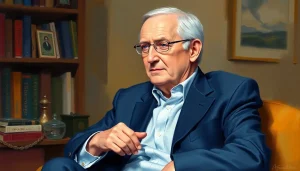From a tiny Princeton thesis questioning Wall Street’s status quo emerged a financial revolution that would eventually save everyday investors billions of dollars and transform the entire investment industry. This revolution was sparked by one man’s unwavering commitment to putting investors first: John C. Bogle, the founder of Vanguard Group.
Bogle’s journey from a curious student to a financial titan is a testament to the power of innovative thinking and steadfast principles. His creation, Vanguard, would go on to become a behemoth in the investment world, championing low-cost index funds and reshaping how millions approach their financial futures.
The Making of a Maverick: Bogle’s Early Years
John Clifton Bogle’s story begins in the depths of the Great Depression. Born in 1929 in Montclair, New Jersey, Bogle’s early life was marked by financial hardship. His family’s struggles during this tumultuous period would leave an indelible mark on his psyche, shaping his future approach to finance and investing.
Despite the challenges, Bogle’s intellect shone through. He earned a scholarship to Blair Academy, where he excelled academically and developed a strong work ethic. This foundation would serve him well as he moved on to Princeton University, where he would plant the seeds of his revolutionary ideas.
At Princeton, Bogle’s curiosity about the financial world blossomed. He chose to write his senior thesis on the mutual fund industry, a decision that would prove pivotal. In his research, he uncovered a startling truth: most mutual funds failed to outperform the overall market. This realization would become the cornerstone of his future investment philosophy.
After graduation, Bogle entered the investment industry, joining Wellington Management Company in 1951. Here, he climbed the ranks quickly, becoming chairman in 1970. However, his tenure at Wellington was not without its challenges. A merger he championed in the 1960s proved disastrous, leading to his ouster from the company in 1974.
This setback, however, would prove to be the catalyst for Bogle’s greatest achievement. Forced to start anew, he saw an opportunity to create something truly revolutionary: a company that would put investors’ interests first.
Vanguard: A New Kind of Investment Company
In 1975, John Bogle founded The Vanguard Group, named after Admiral Horatio Nelson’s flagship at the Battle of the Nile. Just as Nelson’s ship led the British fleet to victory, Bogle envisioned Vanguard leading a revolution in the investment world.
Vanguard’s founding was rooted in a radical idea: a mutual fund company owned by its funds, which in turn are owned by their shareholders. This unique structure allowed Vanguard to operate at cost, passing the savings directly to investors. It was a stark departure from the profit-driven model of traditional investment firms.
Bogle’s vision for Vanguard was clear from the start. He wanted to create a company that would offer investors a fair shake, providing them with low-cost, efficient investment options. This vision was embodied in Vanguard’s first offering: the First Index Investment Trust, now known as the Vanguard 500 Index Fund.
The launch of this fund was met with skepticism and even ridicule from Wall Street. Critics dubbed it “Bogle’s Folly,” questioning how a fund that aimed to match the market’s performance, rather than beat it, could be successful. The initial public offering raised only $11 million, far short of its $150 million goal.
But Bogle was undeterred. He believed in the power of his idea and the benefits it could bring to individual investors. His persistence would pay off in the long run, as the index fund concept gradually gained traction and Vanguard began to grow.
The Bogle Investment Philosophy: Simplicity and Common Sense
At the heart of John Bogle’s investment philosophy was a commitment to simplicity and common sense. He believed that most investors would be better off buying and holding a diversified portfolio of stocks rather than trying to beat the market through active trading.
This belief led to the creation of index funds, which aim to replicate the performance of a specific market index, such as the S&P 500. By doing so, index funds offer broad market exposure at a fraction of the cost of actively managed funds.
Bogle’s emphasis on low-cost investing was revolutionary. He understood that high fees could significantly erode investors’ returns over time. By keeping costs low, Vanguard allowed investors to keep more of their returns, leading to better long-term outcomes.
The Vanguard values of low costs, long-term focus, and putting investors first became the cornerstone of what is now known as passive investing. This approach stands in stark contrast to the active management style prevalent on Wall Street, where fund managers attempt to outperform the market through stock picking and market timing.
Bogle’s investment philosophy also emphasized the importance of staying the course. He advocated for a buy-and-hold strategy, encouraging investors to resist the temptation to react to short-term market fluctuations. This approach not only reduces trading costs but also helps investors avoid the pitfalls of emotional decision-making.
Vanguard’s Growth and Industry Impact
As Vanguard’s low-cost index funds gained popularity, the company experienced explosive growth. From its humble beginnings, Vanguard has grown to become one of the largest investment management companies in the world, with trillions of dollars in assets under management.
The company’s success has had a profound impact on the entire investment industry. Competitors were forced to lower their fees and offer their own index funds to remain competitive. This “Vanguard effect” has saved investors billions of dollars in fees over the years.
Vanguard’s product offerings expanded beyond the original S&P 500 index fund. The company now offers a wide range of index funds and ETFs covering various asset classes and market segments. This expansion has allowed investors to build diversified portfolios at a fraction of the cost of traditional actively managed funds.
The rise of index investing has also contributed to the democratization of investing. By providing low-cost, easy-to-understand investment options, Vanguard has made it possible for millions of everyday investors to participate in the stock market’s long-term growth.
This democratization has given rise to passionate communities of index fund investors, such as the Vanguard Diehards. These groups share knowledge, discuss investment strategies, and champion the principles of low-cost, long-term investing that Bogle espoused.
Bogle’s Legacy: Beyond Vanguard
John Bogle’s influence extended far beyond the walls of Vanguard. He became a vocal advocate for individual investors, often speaking out against industry practices he viewed as detrimental to their interests.
Bogle’s contributions to the investment world were widely recognized. He received numerous awards and accolades, including being named one of the investment industry’s four “Giants of the 20th Century” by Fortune magazine.
His philanthropic efforts were equally impressive. Bogle established the John C. Bogle Center for Financial Literacy, a non-profit organization dedicated to improving financial education. He also wrote extensively on investing, authoring several books that have become required reading for many investors and financial professionals.
The Vanguard book “Common Sense on Mutual Funds,” first published in 1999, is considered a classic in investment literature. In it, Bogle lays out his investment philosophy in detail, providing a roadmap for individual investors to navigate the complex world of finance.
Bogle’s principles have influenced a new generation of investors and financial experts. For instance, the popular financial independence blogger known as Mr. Money Mustache advocates for a Vanguard-centric investment strategy, demonstrating the enduring appeal of Bogle’s approach.
Vanguard’s Continued Commitment to Bogle’s Vision
Even after Bogle’s retirement as CEO in 1996 and his passing in 2019, Vanguard has remained committed to his founding principles. The company continues to be a low-cost leader in the industry, constantly seeking ways to reduce expenses for its investors.
The Vanguard CEO and leadership team have consistently reaffirmed their dedication to Bogle’s vision. They continue to advocate for individual investors and push for reforms in the financial industry.
Vanguard’s influence on the investment landscape remains strong. The company has expanded globally, bringing its low-cost investment approach to markets around the world. It has also embraced new technologies, offering digital advisory services to help a new generation of investors build and manage their portfolios.
The Enduring Importance of Bogle’s Principles
In today’s fast-paced, technology-driven financial markets, John Bogle’s principles might seem quaint to some. Yet, their relevance has only grown over time. As markets become more efficient and information more readily available, the advantages of low-cost, broadly diversified investing have become increasingly apparent.
The rise of algorithmic trading and high-frequency trading has made it even more challenging for active managers to consistently outperform the market. This reality underscores the wisdom of Bogle’s approach: if you can’t beat the market, why not join it at the lowest possible cost?
Moreover, Bogle’s emphasis on long-term investing and avoiding short-term market timing remains crucial advice for investors navigating today’s volatile markets. In an era of 24/7 financial news and social media-driven market movements, the temptation to react to every twist and turn in the market is stronger than ever. Bogle’s steady, patient approach serves as a valuable counterbalance to these short-term pressures.
Conclusion: A Revolution That Continues
John Bogle’s journey from a Princeton student questioning the status quo to the founder of one of the world’s largest investment companies is a testament to the power of innovative thinking and unwavering principles. His creation, Vanguard, has not only grown into a financial powerhouse but has fundamentally changed how millions of people invest and think about their financial futures.
The revolution Bogle started continues to this day. The principles he championed – low costs, long-term focus, and putting investors first – have become increasingly mainstream. Yet, there’s still work to be done. Many investors continue to pay high fees for underperforming active funds, and financial literacy remains a challenge for many.
As we look to the future, the investment industry will undoubtedly continue to evolve. New technologies, changing regulations, and shifting global economic dynamics will present both challenges and opportunities. However, amidst this change, Bogle’s core principles are likely to remain as relevant as ever.
The story of John Bogle and Vanguard is more than just a tale of business success. It’s a reminder of the power of standing up for what you believe in, even in the face of skepticism and ridicule. It’s a lesson in the value of putting the interests of others first. And it’s an inspiration to all those who seek to make a positive difference in the world.
As we navigate the complex world of investing, we would do well to remember Bogle’s simple yet profound advice: “Stay the course. No matter what happens, stick to your program. I’ve said ‘stay the course’ a thousand times, and I meant it every time. It is the most important single piece of investment wisdom I can give to you.”
References:
1. Bogle, J. C. (2007). The Little Book of Common Sense Investing. John Wiley & Sons.
2. Ferri, R. A. (2018). The Power of Passive Investing: More Wealth with Less Work. John Wiley & Sons.
3. Malkiel, B. G. (2019). A Random Walk Down Wall Street: The Time-Tested Strategy for Successful Investing. W. W. Norton & Company.
4. Slater, R. (1997). John Bogle and the Vanguard Experiment: One Man’s Quest to Transform the Mutual Fund Industry. Irwin Professional Publishing.
5. Bogle, J. C. (2015). Bogle on Mutual Funds: New Perspectives for the Intelligent Investor. John Wiley & Sons.
6. Swedroe, L. E., & Berkin, A. L. (2015). The Incredible Shrinking Alpha: And What You Can Do to Escape Its Clutch. BAM Alliance Press.
7. Ellis, C. D. (2013). Winning the Loser’s Game: Timeless Strategies for Successful Investing. McGraw Hill Professional.
8. Bernstein, W. J. (2010). The Investor’s Manifesto: Preparing for Prosperity, Armageddon, and Everything in Between. John Wiley & Sons.












Would you like to add any comments? (optional)